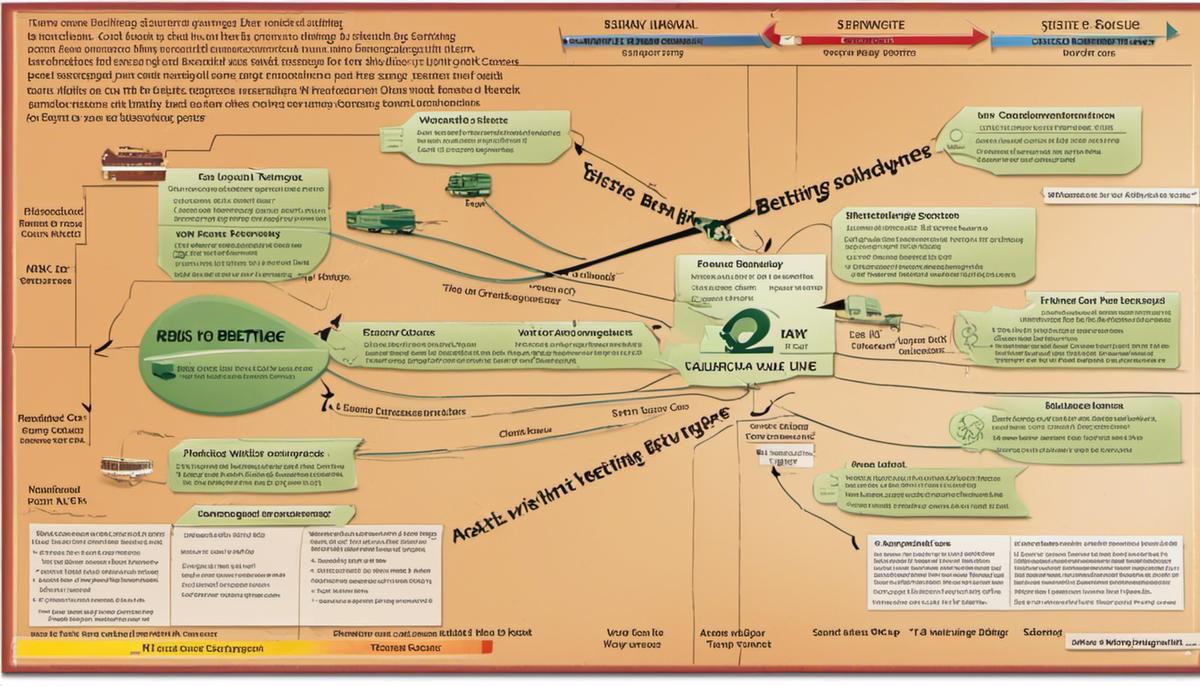BetterYouJourney.com is a participant in the Amazon Services LLC Some of the links in our posts are affiliate links. Click here to see full Disclosure.
Value betting is a strategy that holds the potential to shift the odds in your favor, injecting a layer of strategy and skill into the fundamentally chancy realm of betting. This methodology relies on the nuanced understanding and the analysis of betting odds, probability, and value. The journey to mastering this complex, yet rewarding approach, starts with a deep understanding of the concept, from breaking down probabilities to dissecting the math behind it. As insightful as it may seem, it’s far from conventional betting strategies, as it evolves beyond mere guesses, making every bet an informed decision. The following passages are meant to equip the reader with the knowledge to identify value bets, manage the inherent risks, and harness the power of digital tools and resources. Laced in between the instructive content are engaging case studies that illustrate the dynamic concepts in practice.
Understanding the Concept of Value Betting
Understanding Value Betting
Value betting is a sports betting strategy that revolves around the concept of finding and capitalizing on profitable betting opportunities. The fundamental principle is that you’re not just simply betting on the outcome of an event that you think is most likely to happen; instead, you are identifying situations where the odds available are higher than they should be. If practiced and executed correctly, value betting can lead to consistent and substantial profits over a longer period.
Contrast With Conventional Betting
In conventional or traditional betting, bettors usually place their wagers based on who they believe will win an event. The decision might be influenced by factors such as team form, player performance, or weather conditions, resulting in betting on the favorites or teams with lower odds.
Conversely, value betting is a more strategic approach. It involves placing bets on outcomes that the bettor believes have been overpriced by the bookmakers. This means you are betting on odds that you believe should be lower than what is currently being offered.
Mathematics Behind Value Betting
The concept of value betting is deeply rooted in mathematical principles. To determine value, you must first calculate the implied probability of an outcome occurring and compare this with the probability you have assigned for that outcome.
The implied probability is the probability that the bookmakers’ odds suggest an outcome will happen, and it can be calculated using the formula: Implied Probability = 1 / Decimal Odds.
After calculating the implied probability, you will then estimate the real or true probability of the outcome. This is more subjective and depends on your research and understanding of the event or sport. If your estimated true probability is higher than the implied probability, then it is considered a value bet.
For instance, if a bookmaker has odds for a team to win at 2.00 (implied probability of 50%), and based on your analysis, you believe that the true probability of the team winning is 60%, then this would be a value bet.
It should be noted that this strategy requires rigorous analysis and research of the sport or event you’re betting on, along with a deep understanding of the concept of probability.
Unlocking Profits in Value Betting
Value betting is a strategy that requires diligence and patience. The rewards aren’t typically instant, but the long-term potential is where it truly shines. Profits are derived from consistently identifying bets where the odds are higher than they should be. Whilst no bet is a guaranteed win, the principle of value betting assures that over a large enough array of bets, your winnings will surpass your losses.
The core requirement for success in value betting is endurance. It’s crucial to weather through sporadic losses with the understanding that the chosen strategy will eventually lead to profits. Consequently, smart bankroll management is critical to navigating the inherent ups and downs associated with sports betting.
In essence, value betting isn’t a sprint for immediate returns, but rather a marathon that, with a strategic and patient approach, generates steady profits over time.

How to Identify Value Bets
Decoding Odds and Determining Implied Probability
Before capitalizing on value bets, understanding how to interpret betting odds and calculate the implied probability is essential. Odds are usually presented in fractional (e.g., 5/1) or decimal (e.g., 2.00) formats.
The implied probability provides insight into the bookmaker’s prediction of an event’s outcome. You can determine this by using the formula: Implied Probability = 1 / Decimal Odds. For instance, if a team’s odds of winning are set at 2.00, the implied probability would be 1/2 = 0.5 or 50%.
When you come across a potential value bet, it’s helpful to compare the bookmaker’s implied probability with your own estimated probability. If the event’s likelihood as per your calculations exceeds the implied probability, the bet could offer good value.
Researching Teams and Performance
To make accurate estimations of probability, research is essential. Start by studying team performance, including winning rates, average scores, and head-to-head comparisons. But don’t just focus on surface statistics. Analyze underlying factors like player health, team morale, and recent changes in team composition.
Looking at historical data is also important, as you can often find patterns that indicate potential outcomes. How does a team perform under pressure? How often do they overcome the odds? These are the kinds of questions you should be asking.
Understanding How Sportsbooks Set Their Odds
Sportsbooks set their odds based on two factors: the likely outcome of the event, and the betting behavior of the public. The public’s perception can be influenced by a variety of factors like recent performance, popular sentiment, or media coverage, and this perception, not necessarily the actual probability, often drives how odds are set.
The benefit here is that the public’s perception can be skewed, and it can be lucrative to bet against the public (a strategy referred to as “fading the public”) when you believe that the odds are not reflective of the actual probability.
Navigating Professional Betting Strategies
The world of professional bettors goes far beyond random bets and gut instincts. Successful bettors leverage statistical models, detailed analysis, and algorithms to predict game outcomes and identify value bets. These bets are instances where the odds offered by bookmakers present profitable opportunities. Additionally, their strategies are meticulously tailored to fit the specifics of each sport.
Staying informed of player and team news is critical in their strategy. Elements like injuries or coaching changes can significantly influence game outcomes and ultimately, the odds.
Putting bets in your favor requires consistent research, a good understanding of the betting process and market, and a knack for statistical analysis. By blending these factors, you can start recognizing value bets, spotting opportunities the bookmakers and most bettors might have overlooked.
Successful betting goes beyond rooting for your favorite team; it’s about making strategic, informed decisions. Over time, this tactic leads to more stable and lucrative betting results.

Managing Risks in Value Betting
The Risks Present in Value Betting
Value betting is a strategy centered on exploiting odds that are overpriced – these odds offer higher returns than the actual probability of an event occurring. However, it is crucial to comprehend that even top-tier value betting strategies are not exempt from risks. As with any form of gambling, a responsible approach is mandatory. Despite capitalizing on statistical discrepancies, it’s critical to remember that the conclusion of sporting events can often be unpredictable and never assured.
Bankroll Management
One of the key risk management techniques in value betting is bankroll management. This is essentially determining how much money you’re willing to risk on each bet. Typically, bettors decide on a certain percentage of their total bankroll to stake on each bet. For instance, you may decide that you will never risk more than 1% of your bankroll on a single bet. This means that if you have a bankroll of $1000, you would never place more than $10 on a single bet. This helps limit losses and extend your betting life even during a bad run.
Diversification
Another risk management technique is diversification. This entails betting on a variety of different sports or markets. This not only provides more opportunities to find value but may reduce your risk because not all your bets are dependent on the outcome of a single match or event. For example, you might bet on both football and basketball games, or perhaps a mix of domestic and international events.
Understanding When to Bet and When Not to
Another crucial aspect of managing risks in value betting is understanding when to bet and when not to. This involves conducting thorough research and analysis of available odds and potential outcomes. Bet whenever you find value, but abstain when the value is not clear.
Several factors can influence whether a bet offers value or not, including injuries to key players, recent team form, and even weather conditions. As a value bettor, it’s essential to consider all these aspects before deciding to place a bet.
Recognizing the Variance in Value Betting
In value betting, winning and losing streaks are inevitable due to variance. You might place several bets that offer value and still end up losing them all. This doesn’t necessarily mean that your strategy is flawed – it could simply be a result of bad luck. The key is to stay disciplined and stick to your strategy during these periods, rather than trying to chase losses or bet more to compensate.
To sum it all up, value betting is a risk management strategy that involves responsible gambling practices. The principles underpinning this method focus on managing a betting bankroll effectively, diversifying placed bets, comprehending the right moments to place a bet and when to abstain, as well as identifying the inherent variance in betting outcomes.

Practical Examples and Case Studies of Successful Value Betting
Understanding the Concept of Value Betting
Essentially, the concept of Value Betting is framed around a simple sports betting strategy – identifying games where the odds have been set at a price higher than they ought to be. The cornerstone of this strategy is grounded in probability laws. If the likelihood of an event occurring is significantly high, and bookmakers have priced odds higher than this probability, then that bet becomes a value bet.
Practical Example: Asian Handicap Soccer Betting
Take, for example, Asian Handicap betting in soccer, a form of sports betting that provides a bit more leverage and flexibility with odds. Here you’ll bet on the outcome of the game but the catch is that one team has a head-start or deficit designed to level the playing field.
In a game between Manchester City and Watford, let’s suppose you place a bet on Manchester City -1.5 at odds of +135 (a $100 bet wins you $135). The “-1.5” means that Manchester City must win by 2 goals or more for your bet to win.
Identifying the Value in Soccer Betting
Identifying the value in this bet involves, among other things, analyzing both teams’ current form, injury situation, motivational factors and comparing these factors with the given odds.
In this example, if analysis shows that Manchester City – despite having to overcome the 1.5 goal deficit – is more likely to win the game than the odds of +135 suggest, a value bettor would proceed with their stake.
Using a simple formula for value, [Value = (Probability * Decimal Odds) – 1], if the calculated value is greater than 0, it’s seen as a value bet. If Manchester City wins by 2 goals or more +60% of the time, the computed value is [(0.6 * 2.35) – 1] = 0.41 indicating a 41% value, and a worthwhile bet.
Case Study: NFL Betting
For another practical case study, consider a hypothetical NFL game where the New England Patriots are playing against the New York Jets. A reputable bookmaker offers odds of +150 for a Patriots’ win, implying a 40% chance for this outcome.
However, after analyzing the teams’ performance in past games, injury reports, weather predictions and considering other relevant factors, you as a bettor believe that Patriots have a 50% chance of winning.
To determine the value of the bet, you would use the value formula: [Value = (Probability * Decimal Odds) – 1]. In this instance, with decimal odds of 2.5 (American +150), the computation is [(0.5 * 2.5) – 1] = 0.25 which indicates a 25% value and qualifies as a good value bet.
Applying Case Studies in Value Betting Strategy
Reviewing real-world examples provides insight into the consistent strategy of value betting. This method centers around evaluating the statistical probability of a certain result, juxtaposing this with the available odds from the bookmaker, and placing a bet when significant value is clear. It’s noteworthy to spot in these cases that value bets are commonly made on the underdogs, or in situations that may not have the highest probability of occurrence, but yield greater returns if they do occur.
The case studies of both the soccer game and the NFL game demonstrate essential examples of value bets by showcasing probabilities that were higher than what the odds given by the bookmaker reflected. By persistently applying the principles of value betting, punters can yield significant profit over an extended period, steering away from instant, short-term gains.

Digital Tools and Resources for Value Betting
Utilizing Odds Comparison Tools for Value Betting
The strategy of value betting leans extensively on the comprehension and analysis of varying odds to pinpoint opportunities for likely gain. A host of online odds comparison platforms have simplified this task by providing real-time betting odds from various bookmakers. Notable among these platforms are Oddschecker, Odds Portal, and BetBrain.
These tools empower punters to directly compare odds for distinct matches from an array of betting platforms. They help identify instances where a bookmaker gives superior odds for an outcome compared to others, indicating a potential value bet. However, getting the most out of these tools necessitates a sharp understanding of the odds mechanism as well as prompt identification of discrepancies.
Betting Calculators Can Provide Essential Information
Accurately determining the potential returns from a bet is central to the value betting strategy. Several digital tools, such as betting calculators, are designed specifically for this purpose. These calculators allow bettors to input the odds and their stake to quickly calculate potential returns.
A betting calculator can help identify value bets by determining if the potential returns outweigh the risk involved. Online betting calculators like AceOdds, BetCalc and Pinnacle Sports Betting Calculator are widely used by bettors for this purpose. These tools allow the users to perform various types of bet calculations, from single and multiple bets to system and lay bets.
Advanced Software Models for Betting
One of the most effective ways to approach value betting is to use advanced software models. These models can analyze a huge array of data to identify betting opportunities that might be overlooked by humans. This data can include everything from historical performance and current form, to weather conditions and injuries on a team.
There are a number of software models available, each offering unique features and strengths. RebelBetting, Trademate Sports and Betegy are examples of such software. They offer comprehensive value betting software solutions by identifying statistically calculated value bets, providing real-time odds comparisons, and even offering automatic betting on some platforms.
The Use of Online Betting Communities and Blogs
Another valuable resource for individuals interested in implementing a value betting strategy are online betting communities and blogs. Platforms like the Reddit r/SoccerBetting forum, Betting Expert, and the OLBG Tipsters forum allow for discussion and sharing of tips among bettors. Blogs run by betting experts offering odds analysis, betting predictions, and strategy guides can also provide invaluable advice for both beginners and seasoned bettors. Examples of such blogs include the Pinnacle Betting Resources blog and the Smart Sports Trader blog. These online resources provide the opportunity to learn from the experiences of others and to stay informed about the latest trends in betting.
All these digital tools and resources for value betting should ultimately be used as part of a broader betting strategy. While they can speed up the process and increase accuracy, they are not a guarantee of making profits from betting. Betting still includes significant risks, hence it’s important to bet responsibly and use these tools to make informed decisions.

Stepping into the world of value betting strategy is not just about understanding its theoretical base, but also about recognizing the latent risks and handling them deftly. It’s about leveraging the odds, learning how sportsbooks work and using this knowledge to your advantage, but doing so within the boundaries of responsible gambling. Real-world examples highlight the workings of successful value bets, providing insights into honing this calculation-focused approach. To ease your foray, a plethora of digital tools plays a pivotal role, facilitating efficient odds comparison, stake computing, and advanced modeling. The essence of value betting lies in unearthing the profitable opportunities masked within the dynamics of betting. It challenges conventional strategies with its more analytical stance, paving the way for a smart, risk-managed betting journey.








